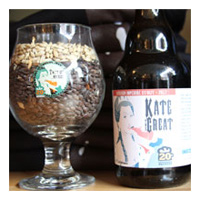
March Madness? Nope. Kate the Great is coming. Every year, Portsmouth Brewing literally rolls out the barrel of the 12 percent Russian Imperial Stout widely regarded as one of the best beers on the planet. Well, make that 14 barrels, half of which makes it to draught.
And every year, in just one day, it’s gone. In 12 hours, the Portsmouth Brewery will rack up $53,000 in sales: $42,000 from food and beer and another $11,000 from first-day bottles and merchandise. The brewery will also use the release of Kate the Great for charity, hosting a lottery that will raise another $30,000 just for a chance to buy a bottle of the beer.
“I think right now, the level of excitement about good beer and special beer is at an all-time high,” said Portsmouth Brewery Founder Peter Egelston. “This kind of event is a metaphor for what is going on in the beer industry as a whole.”

What’s going on is that breweries are finding cash in the intentional scarcity they generate through one-day release events, creating a way to bump up revenue while increasing buzz and loyalty. The Kate the Great release is just one example. In Munster Ind., Three Floyds Brewing hosts “Dark Lord Day,” a pilgrimage for many craft connoisseurs. And in Placentia Calif., The Bruery has evolved demand for their most anticipated beers into a special ‘Reserve Society,’ in which gives their most loyal customers pay for first access to rare releases — particularly its “Black Tuesday” stout.
It’s not clear how all three of these events reached a fever pitch of anticipation, but for Kate the Great, the 2006 apparently lit the fuse. That year, Beer Advocate magazine named Kate the “Best Beer in America.” The following year, customers flocked to downtown Portsmouth.
“I remember in 2005 when Tod (Mott) was complaining that the beer wasn’t moving fast enough,” said Portsmouth Brewery Spokesperson JT Thompson. “It’s hard to believe that beer used to sit in a serving tank for months.”
Since then, things have taken off, and not just for Kate the Great. At Three Floyds, The brewery sold through 6,000 admission tickets for this year’s Dark Lord Day in a matter of minutes. At a $15 price point, the company was able to generate $90,000 in mere moments. And at the Bruery, which specializes in barrel-aged offerings and 750 ml issues of incredibly unique beer, consumers are so devoted that they’ll fork over $295 to be part of the Reserve Society.
That membership guarantees an allotment of the company’s rarest offerings, including two bottles of Black Tuesday. Many members will tell you that the guarantee of receiving those two bottles is worth the cost of membership alone. When you can get them, bottles of the 18+ percent, barrel-aged imperial stout sell for $30 each, but that’s at the brewery. On Ebay they’ve been known to top $300 apiece.
The Bruery sold 1000 Reserve Society memberships for 2012. If you’re doing the math, that’s an immediate $295,000 the company makes without having to immediately turn over product. They then use that money to buy equipment and make more beer.
“It’s almost like getting a loan from our fans,” said Benjamin Weiss, the manager of sales and marketing. “It takes a lot of trust in them to throw down some money and hope that we are going to give them something good in return.”
But the reward for the breweries is more than financial. They generate buzz and attention at a time when the battle to be known for brewing quality is at a premium in the craft beer world.
“Especially in the modern way of marketing, you can’t beat the hype you get off events like these,” said Weiss. “You want people talking about it, even if they can’t physically be there on release day.”
Egelston agreed, saying the benefit extends beyond the day of the release.
“We benefit all year round from being known as the place that has this really highly rated beer,” he said.
But if the beer is so good, why not distribute it more widely? Other breweries with highly-coveted special release events seem to have succeeded in transitioning to more traditional distribution methods.
The Santa Rosa, Calif. based Russian River Brewing Company, for example, previously only made its Pliny the Younger available at the brewpub. Recently, the beer has been brewed in larger quantities and gone out for limited distribution while at the same time still bringing the fervor associated with its once-a-year release. The Grand Rapids, Mich based Founder’s Brewing Company recently announced that it would be brewing three times the volume for the 2013 release of its highly-anticipated Kentucky Breakfast Stout, which is already distributed in limited amounts.
So is increased availability the inevitable fate for Kate? Maybe.
“Perhaps these events are indicative of where beer culture is right now and maybe in another five or ten years we will have moved on to a different place and there won’t be release events like this,” said Egelston. “If Kate was available day-in and day-out or even as a seasonal, would it be as highly sought after? I don’t know. We may try that someday, but don’t hold me to it.”

